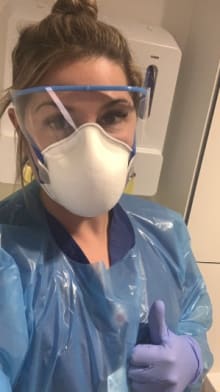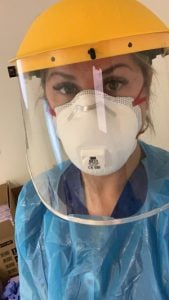We got in touch with Jess, who is an ITU nurse. She is working full time during the COVID-19 outbreak, helping patients on the hospital front line, while also managing type 1 diabetes.
Jess is part of the team at the Intensive Treatment Unit at the Royal Papworth hospital. She is a newly qualified nurse and works with patients every day. She feels very lucky to be part of such an amazing team – all the nurses at Papworth are really supportive and have never given her issue if she needs to go out and test her blood sugar levels.
“Honestly, I feel really mentally proud. I know it is such a scary time for everyone, but I’m staying positive. I’m so proud of what the NHS is achieving, and I feel really lucky to be a part of that. I’ve wanted to be a nurse for ages, and now I’m newly qualified, working in ITU during a global pandemic! So yeah it is definitely overwhelming at times, but I’ve had such good support at the Royal Papworth, from all the staff there. They are all amazing mentors, so it has really helped my transition, as a newly qualified, and with diabetes, as well as with everything that has been going on.”

Jess was diagnosed with type 1 diabetes when she was 25. In the four years since, she has learned to manage her blood sugar levels with finger prick testing and insulin injections.
A typical day for Jess involved testing her blood sugars at least 8 times. Before she eats, before she drives, and when she can while at work. One of the impacts of the novel coronavirus that people with diabetes working in hospitals are reporting is how the personal protective equipment (PPE) can make testing difficult.
Of course, PPE is incredibly important and is saving lives and limiting the spread of the disease. But getting in and out of it can make testing that bit more complicated. Jess has to leave the work area, remove the PPE and test or eat, so testing can become time consuming during her shift.

Despite this, she has manged to keep her blood sugars fairly stable during this time of upheaval. When she began working in January, she reported that her sugars were a bit more up and down, but as she settled into a routine, her sugars settled too. She said: “They can sometimes be a bit erratic, as anyone with diabetes will know! But I just try and make sure I’m prepared so I’ve always got glucose with me, I’m always able to go and test.”
“It’s a challenge! I won’t say that it isn’t. Especially working in such an acute area. Living with type 1 diabetes is a constant balancing act. You’re always thinking about your blood sugar levels, your activity levels, what your carb intake is. So many things can have an impact on your blood sugar levels – I just feel like I’m constantly doing maths.
“At work I think I try and remember that I need to look after myself, which can go against your instinct as a nurse a bit. You always feel like you need to put your patient first. But it has really taught me that planning ahead is so important, and you can only control what you can control – as long as you use that and look back and make changes… I’m very lucky that the Royal Papworth are so supportive to me.”
Three key things
When asked what she would like to say to others in a similar situation, Jess made it very clear: “Three key things. The first one is exercise. For me it’s invaluable. I joined a CrossFit gym in Stevenage about 18 months ago and it has been so good for my stress management and my diabetes management. It’s been really difficult not being able to go to the gym, but they’ve been posting home workouts, so I’ve been doing them and going for runs.
“Secondly, utilise the people around you. I’m lucky that I’ve got a really good close-knit group of friends who are always up for a laugh or a gin and tonic over a video call. They are absolutely incredible, and I couldn’t do without them.
“Lastly, is my partner. With him being a paramedic, obviously he understands the stresses that I have when I go to work. We’re lucky that we can come home, and we can debrief with each other. I know not everyone will have that, but it is so important to find people who understand because we do live in quite different worlds sometimes and to find people who can relate to you is something that should definitely be utilised if it can be.”
“I just think that ultimately diabetes is such a challenge, but it shouldn’t stop you from living your life. I wish that I’d been told that when I was first diagnosed. I just thought ‘that was it’ and I couldn’t live a normal life anymore… as much as you think you can’t get through it sometimes, you really can. Diabetes lives with me; I don’t live with it. It has taught me confidence and self-belief. Because if you can do this, you can do anything.”
Jess is doing a fantastic job, and we are really lucky that she was able to spend some time with us telling her story. The work that she and the rest of the NHS are selflessly doing at this time is humbling and we are truly grateful to any and all keyworkers.



